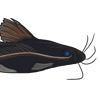| Scientific Name | Lepthoplosternum pectorale (Boulenger, 1895) |
| Common Names | Armoured Catfish Chaco Catfish, Chaco-pansermalle (Denmark), Dwarf Hoplo |
| Type Locality | Monte Sociedad, Chaco Dept., Paraguay. |
| Synonym(s) | ? pectorale, Callichthys pectoralis, Hoplosternum pectorale |
| Pronunciation | lep THOP low STERN um |
| Etymology | Lepthoplosternum: From the Greek leptos, meaning small and hoplosternum; in reference to the small size. Hoplosternum: From the Greek hoplon, meaning shield and sternum, meaning breast; in reference to the prominent coracoid bones on the breast. |
| Articles | |
| Size | 60mm or 2.4" SL. Find near, nearer or same sized spp. |
| Identification | Lepthoplosternum species are the smallest of the Callichthyinae (maximum SL = 60.3 mm). They are distinguished by two unique traits: (1) a lower lip with a deep medial notch and a smaller lateral notch, forming two fleshy semi-triangular projections on each side of the midline, and a single unbranched ray preceding the branched rays on the anal fin. This species is sometimes confused with Callichthys callichthys. The visible coracoit bones by the pectoral fins is an indication that it is some form of Hoplosternum or Lepthoplosternum species. In Callichthys, this area is covered by skin and not visible (although the same bone is there in the fish. Callichthys also has a flatter overall body. |
| Sexing | Mature males of Callichthys, Dianema, Hoplosternum, Lepthoplosternum, and Megalechis have a thick adipose body on the ventral surface of the pectoral fin. In Dianema, Hoplosternum, Lepthoplosternum and Megalechis (but not in Callichthys), the coracoid bones are at least partially exposed and expanded medially. In Dianema, Hoplosternum and Megalechis, these medial expansions of the coracoids are especially developed, covering most of the skin between the pectoral fins and sometimes overlapping at the midline in fully developed mature males, however there does not appear to be a similar sexually dimorphic expansion of the coracoids in Lepthoplosternum. |
| Distribution | South America: Paraguay River basin. La Plata, Paraná, Paraguay (click on these areas to find other species found there) Login to view the map. |
| IUCN Red List Category | Least Concern , range map and more is available on the IUCN species page. Last assessed 2020. |
| pH | 5.8 - 7.8 |
| Temperature | 20.0-22.0°C or 68-71.6°F (Show species within this range) |
| Other Parameters | dH°25 |
| Breeding | Unreported. |
| Breeding Reports | There is but a single breeding report, read it here. |
| Reference | Proceedings of the Zoological Society of London 1895 (pt 3), pp 525. |
| Registered Keepers | There are 15 registered keepers, view all "my cats" data. |
| Wishlists | Love this species? Click the heart to add it to your wish list. There are 4 wishes to keep this species, see who wants what. |
| Spotters | Spotted this species somewhere? Click the binoculars! There are 7 records of this fish being seen, view them all. |
| Forum BBCode | |
| Search for L. pectorale | |
| Look up L. pectorale on AquaticRepublic.com | |
 | Look up L. pectorale on Fishbase |
 | Look up L. pectorale on Encyclopedia of Life |
 | Look up L. pectorale on Global Biodiversity Information Facility |
| LFS label creator ARN ref:1.1.9.13 | |
| Last Update | 2023 Aug 06 02:52 (species record created: 2001 Apr 21 00:00) |





/siluriformes/callichthyidae/lepthoplosternum/pectorale/1.jpg)
/siluriformes/callichthyidae/lepthoplosternum/pectorale/2.jpg)
/siluriformes/callichthyidae/lepthoplosternum/pectorale/3.jpg)
/siluriformes/callichthyidae/lepthoplosternum/pectorale/4.jpg)
/siluriformes/callichthyidae/lepthoplosternum/pectorale/5.jpg)